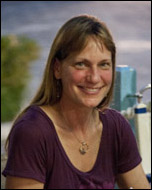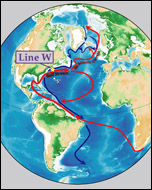
Ruth Curry
is a Senior Research Specialist at Woods Hole Oceanographic Institution and Adjunct Scientist at Bermuda Institute of Oceanography who has been out measuring ocean circulation and water mass properties since 1980. She is interested in how these are changing with time and their role in the global climate system. A particular focus of her research has been on ocean salinity distributions, shifts in the global fresh water balance, and how these affect the Atlantic meridional overturning circulation (AMOC). Recent field work has also measured abyssal circulation pathways and water mass transformation in the North Atlantic. She is presently running the Mid Atlantic Glider Initiative and Collaboration (MAGIC) Lab in Bermuda to investigate nutrient and carbon cycling in the Sargasso Sea.
 DynAMITE Program
DynAMITE Program
This field program is investigating the processes by which the densest waters in the Atlantic Meridional Overturning Circulation (AMOC) are transformed into warmer, lighter density classes (Lower North Atlantic Deep Water: LNADW) and the circulation through the interior western basin that results. The dense waters originate as stratified inflows from the South (Antarctic Bottom Water: AABW) and from the North (Denmark Strait Overflow Water: DSOW). Along their flow paths, turbulent mixing causes these dense waters to entrain overlying warmer waters changing the characteristics of the bottom flows, weakening their stratification, and making them more buoyant. The resulting upward transfer of mass has consequences for the abyssal circulation and for ocean budgets of heat, mass and tracers that are important to Earth's climate system. Visit the Dynamite Website »
 Line W
Line W
Located on the continental slope south of New England (near 40ºN, 70ºW) Line W is one component of a long-term climate observing system investigating the deep limb of the Atlantic meridional overturning circulation (AMOC). Combining an array of moored instruments with shipboard observations, Line W is designed to directly measure the time dependence of volume transport, advection of property anomalies, and propagation of topographic Rossby waves and boundary waves in the equatorward flowing deep western boundary current (DWBC). These measurements are key to clarifying the deep ocean response to variability in high-latitude air-sea exchanges and, ultimately, the ocean's role in global climate variability through changes in its transport of heat and freshwater.
Visit the Line W Website »
 Hydrobase Database
Hydrobase Database
HydroBase3 is a tool for climatological analysis of oceanographic properties. The package is comprised of software and database products that together provide a flexible means of constructing and analyzing datasets customized to investigators' research needs. A graphical user interface has been built to enable running HydroBase3 within a Matlab environment.
Visit the Hydrobase Website »
 Hydrobase Database
Hydrobase Database Line W
Line W